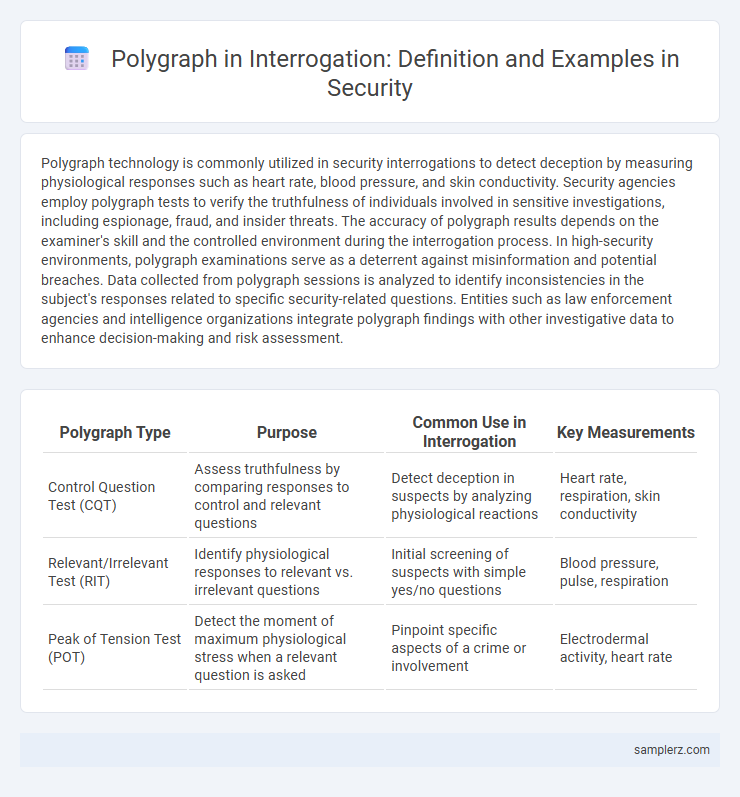Polygraph technology is commonly utilized in security interrogations to detect deception by measuring physiological responses such as heart rate, blood pressure, and skin conductivity. Security agencies employ polygraph tests to verify the truthfulness of individuals involved in sensitive investigations, including espionage, fraud, and insider threats. The accuracy of polygraph results depends on the examiner's skill and the controlled environment during the interrogation process. In high-security environments, polygraph examinations serve as a deterrent against misinformation and potential breaches. Data collected from polygraph sessions is analyzed to identify inconsistencies in the subject's responses related to specific security-related questions. Entities such as law enforcement agencies and intelligence organizations integrate polygraph findings with other investigative data to enhance decision-making and risk assessment.
Table of Comparison
| Polygraph Type | Purpose | Common Use in Interrogation | Key Measurements |
|---|---|---|---|
| Control Question Test (CQT) | Assess truthfulness by comparing responses to control and relevant questions | Detect deception in suspects by analyzing physiological reactions | Heart rate, respiration, skin conductivity |
| Relevant/Irrelevant Test (RIT) | Identify physiological responses to relevant vs. irrelevant questions | Initial screening of suspects with simple yes/no questions | Blood pressure, pulse, respiration |
| Peak of Tension Test (POT) | Detect the moment of maximum physiological stress when a relevant question is asked | Pinpoint specific aspects of a crime or involvement | Electrodermal activity, heart rate |
Understanding Polygraph Use in Security Interrogations
Polygraph examinations analyze physiological indicators such as heart rate, blood pressure, respiration, and skin conductivity to detect deception during security interrogations. The use of polygraphs helps security personnel identify inconsistencies in suspect statements, improving the accuracy of threat assessments and preventing security breaches. Effective training in interpreting polygraph results enhances interrogation strategies, making the tool valuable in high-stakes security environments.
The Role of Polygraph Tests in Investigative Interviews
Polygraph tests serve as a critical tool in investigative interviews by measuring physiological responses such as heart rate, blood pressure, and skin conductivity to assess truthfulness. Trained examiners analyze variations in these indicators to identify possible deception, enhancing the accuracy of interrogations. Incorporating polygraph results with corroborative evidence improves decision-making in security and law enforcement contexts.
Types of Polygraph Questions Used During Interrogation
Types of polygraph questions used during interrogation include relevant, control, and irrelevant questions to assess truthfulness effectively. Relevant questions focus on the specific issue under investigation, control questions are designed to provoke a physiological response unrelated to the main issue, and irrelevant questions serve as baseline measurements. This structured questioning enables examiners to compare physiological responses and identify deception accurately during security interrogations.
Real-World Case Studies: Polygraph in Security Settings
Polygraph examinations played a crucial role in the 2001 anthrax attacks investigation, helping security agencies identify potential suspects by analyzing physiological responses under stress. In airport security, polygraphs have been employed to screen personnel with access to sensitive areas, reducing insider threats by detecting deception during background checks. Law enforcement agencies also utilize polygraph tests in counterintelligence operations to verify loyalties and uncover espionage activities.
Step-by-Step Polygraph Interrogation Process
During a polygraph interrogation, the examiner begins by explaining the procedure and obtaining informed consent from the subject. Next, baseline physiological responses such as heart rate, respiration, and galvanic skin response are recorded during control questions. The process continues with relevant questions while monitoring physiological data for significant deviations that may indicate deception or stress.
Legal Considerations for Polygraph Evidence in Security
Polygraph evidence in security interrogations requires strict adherence to legal standards, as courts often scrutinize its reliability and admissibility. Federal and state jurisdictions vary widely, with many limiting polygraph use due to questions about accuracy and potential violation of constitutional rights. Security professionals must ensure compliance with regulations such as the Employee Polygraph Protection Act (EPPA) and obtain informed consent to avoid legal challenges during security investigations.
Advantages and Limitations of Polygraph Interrogation
Polygraph interrogation offers advantages such as detecting physiological responses linked to deception, which can aid in identifying inconsistencies during security screenings or criminal investigations. However, limitations include the risk of false positives due to anxiety or medical conditions, as well as the lack of scientific consensus on accuracy, making polygraph results inadmissible in many courts. Effective use of polygraphs requires trained examiners and should be supplemented with corroborative evidence to enhance overall interrogation reliability.
Training Security Personnel for Polygraph Administration
Training security personnel in polygraph administration enhances the accuracy and reliability of interrogation outcomes. Comprehensive instruction covers physiological indicators, question formulation, and ethical considerations, ensuring practitioners can effectively detect deception. Mastery of polygraph techniques strengthens internal security protocols and supports investigative integrity in sensitive environments.
Ethical Implications of Using Polygraphs in Interrogations
Polygraphs, often used in security interrogations to assess truthfulness, raise significant ethical concerns due to their questionable accuracy and potential for false positives. The reliance on physiological responses such as heart rate and sweating may lead to wrongful accusations and violate individual rights, impacting the fairness of investigations. Ethical frameworks emphasize informed consent and the risk of coercion, highlighting the need for cautious application and supplementary verification methods in security protocols.
Future Trends of Polygraph Technology in Security
Emerging polygraph technologies integrate artificial intelligence and biometric data analysis to enhance accuracy and reduce human bias in security interrogations. Future trends include real-time physiological monitoring combined with facial recognition and voice stress analysis, enabling more comprehensive deception detection. Advanced machine learning algorithms will continuously improve anomaly detection, supporting security agencies in making faster and more reliable decisions during suspect assessments.

example of polygraph in interrogation Infographic
 samplerz.com
samplerz.com